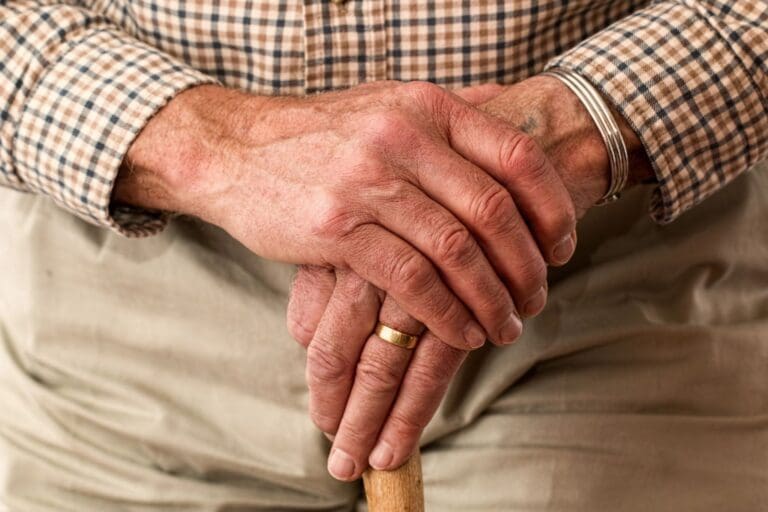Obstinacy

Obstinacy
Sami – My Uncle
Using the strategy of seeking forgiveness rather than permission can be effective in creatively managing the stubborn behaviors of elderly relatives, such as poor eating habits. This approach allows caregivers to implement necessary changes discreetly and adjust strategies based on the outcomes.
I’ve always known my Uncle Sami as a steadfast man with his own set of rules, especially about his eating habits. His “official room,” filled with model airplanes, a fridge, and a pantry, was his haven, though not exactly stocked with the healthiest of choices.
One day, seeing him continually reaching for junk food, I decided to act, well aware that a direct confrontation would lead nowhere. So, in a moment of quiet rebellion, I snuck into his cherished space and replaced his usual snacks with healthier options, my heart pounding with the thrill of my covert operation.
I replaced the inside of a box of his chocolates with sugar free chocolates. Inside the bag of caramel popcorn went organic popcorn with olive oil.
Next afternoon, I got a call as expected. His voice, booming and incredulous, came through the phone, “Rosie! Have you been tampering with my office?”
Caught but unabashed, I answered with a sprinkle of mischief and innocence, “Absolutely, Uncle Sami! I thought it was time your snacks matched the vintage of your model planes—historically appreciated but with a modern twist. Who knew health could sneak in wearing a disguise?”
His initial sternness softened into amusement, “Rosie, you’re a riot. Some of those ‘disguises’ weren’t half bad. So, I will let it go just this time.” he said sternly!
This little victory lit a spark in me. If I could sneakily upgrade his snack selection, what other fun and unexpected changes could I introduce to Uncle Sami’s life? My imagination ran wild with possibilities.
From switching up the decor in his “official room” to introducing him to various age tech solutions, I was ready to embark on a mission of transformation, one surprise at a time. My crusade for bringing health, safety and excitement into Uncle Sami’s world was just beginning.
For my next grand attack (yes, pun gloriously intended), I set my sights on eradicating the persistent ants staging a coup in his kitchen. With each new mission, I eagerly anticipated the inevitable interrogation.
“Rosie, why in the world have you interfered with my stuff again?” he inquired, his tone a mix of irritation and bafflement.
Spotting an opportunity for some comedic relief, I respond, “Well, Uncle, I noticed the ants were throwing a bigger party in your kitchen than we ever did. Thought it was only polite to shut it down. Apologies for bypassing the invitation committee!” My voice was a blend of feigned innocence and a mischievous undertone, hoping to defuse his frustration with a laugh.
Over time, I learned to maneuver around Uncle Sami’s obstinacy with a mix of grace and cunning. Each unsolicited intervention led to positive changes, albeit met with initial resistance.
“Rosie, you’re a sneaky one, you know that?” he’d say, a touch of reprimand laced with a hint of admiration. “But I guess I should thank you for looking out for this old man.”
Our interactions, a blend of admonishment, apologies, and the occasional thank you, painted a vivid picture of my deep-seated commitment to his well-being. In navigating Uncle Sami’s world, I’d mastered the art of seeking forgiveness rather than permission, driven by a profound love that knew no bounds, even when it meant overstepping them from time to time.

The Art of Subtle Care
Charlotte and Harold’s Story
Uncle Harold had always taken great pride in being self-reliant, maintaining the same routines that had defined his life since his youth. Despite his advancing years, Harold stuck to his habits as if he were still a younger man, enjoying rich, hearty meals and indulging in his favorite snacks. As time passed, I noticed his health subtly declining. One afternoon, after finding him surrounded by unhealthy snacks, I decided it was time for a change.
“Uncle Harold, have you ever thought about trying some healthier snacks?” I asked casually, not wanting to provoke his stubbornness.
He shot me a skeptical glance. “Healthy snacks? What’s wrong with my usual treats?”
Undeterred, I decided to take matters into my own hands. The next time I visited, I replaced his beloved chips and chocolate bars with baked snacks and sugar-free alternatives. The following day, I received the expected call.
“Charlotte, what happened to my snacks?” His voice was a mix of amusement and annoyance.
“Just thought you might enjoy something new, Uncle Harold,” I replied innocently. “Sometimes a change can be refreshing.”
He grumbled but didn’t argue further. Encouraged by this small victory, I continued my stealthy campaign. One evening, I swapped his high-sugar ice cream for a lower-calorie yogurt version. The next day, he called again.
“Charlotte, this ice cream tastes different. What did you do?”
“Just a new flavor, Uncle. Thought you’d like to try it,” I said, stifling a laugh.
Over the next few weeks, I noticed subtle changes. Uncle Harold seemed more energetic, and his mood improved. One day, he admitted, “You know, Charlotte, I have been feeling a bit better lately. Maybe your meddling isn’t so terrible after all.”
Taking that as a green light, I expanded my efforts. I introduced more fruits into his snack rotation and made small, healthier green adjustments to his meals. Each change was met with initial skepticism but eventually accepted.
One afternoon, I visited him with a basket of fresh produce. “I thought we could make a healthy salad together,” I suggested.
He eyed the basket warily. “I suppose it wouldn’t hurt to try.”
As we chopped vegetables and prepared the salad, I shared stories about the physical and mental benefits of healthy eating. To my surprise, Uncle Harold listened intently, even asking questions about different ingredients.
“This isn’t half bad,” he admitted after taking a bite. “Maybe you’re onto something, Charlotte.”
Our relationship deepened as we bonded over our culinary experiments. Uncle Harold’s stubbornness softened, and he began to appreciate the positive changes in his life. My strategy of seeking forgiveness rather than permission had paid off, allowing me to care for him in a way that respected his independence while gently guiding him toward better health.
In the end, it was more important than just healthier snacks or meals. It was about the time we spent together, the stories we shared, and the new memories we created. Through my creative and sometimes sneaky efforts, I not only improved Uncle Harold’s health but strengthened our bond and trust in a way that I would cherish forever.

The Culinary Standoff
Ryan and Raymond’s Story
Raymond, a sprightly seventy-five-year-old with silver hair and a fierce determination, stood in his kitchen, gripping a wooden spoon. Known for his traditional dishes and steadfast ways, he grew cranky if meals were not prepared to his standards. Additionally, his arthritis had been acting up, but he refused to let it hinder his cooking. Ryan, his grandson, watched him struggle with concern.
“Grandpa Ray, let me help you chop those vegetables,” Ryan suggested gently.
“No, Ryan. I’ve been cooking my way for fifty years. Like I have said before, I don’t need help,” he replied, his voice firm.
Ryan nodded, respecting his resolve but hatching a plan. The next morning, he arrived early and quietly entered the kitchen. He washed and chopped the vegetables, placing them neatly in the fridge. When Raymond came down, he found the prepped ingredients waiting.
“Who did this?” he muttered, puzzled but relieved. He used the chopped vegetables, marveling at how much easier it was.
Day after day, Ryan continued his secret assistance. He prepped ingredients, kneaded dough, and even marinated meats, all while Raymond slept. Soon, he began to notice how smoothly his cooking went but couldn’t pinpoint why.
One afternoon, as he prepared his famous rigatoni, he called out, “Ryan, can you bring me the garlic?”
Ryan handed him the garlic, already peeled and minced. He looked at him, eyes narrowing slightly. “You’re behind this, aren’t you?”
Ryan smiled sheepishly. “I just want to make things easier for you, Grandpa Ray. You don’t have to do everything alone.”
He sighed, his stern expression softening. “I suppose you’ve been a help. But I still want to cook my way.”
“Of course,” Ryan agreed. “I’ll just make sure you have what you need.”
From that day on, a silent understanding formed between them. Ryan prepped the kitchen each morning, and Raymond continued to cook his beloved dishes, his pride intact. The kitchen became a place of subtle teamwork, and as the aroma of spices filled the air, so did a sense of mutual respect and care.


